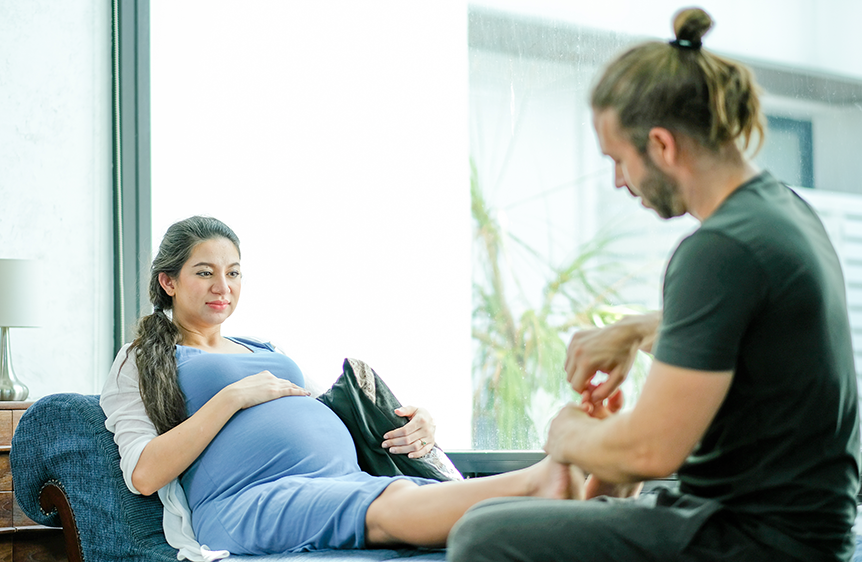Yes, foot massage is generally considered safe and effective for relieving swollen feet during pregnancy, provided it is performed by a trained professional using gentle, appropriate techniques. Such massage supports healthy circulation, reduces fluid retention, and promotes relaxation. Care should be taken to avoid certain pressure points and to assess for signs of blood clots or high-risk conditions. Professional guidance guarantees safety and comfort. Further information includes techniques, aftercare, and when to seek medical advice.
Understanding Swollen Feet in Pregnancy

Why do so many expectant mothers experience swollen feet during pregnancy? Swelling, also known as edema, is a common phenomenon in pregnancy, affecting many women, particularly in the later months.
Clinically, this swelling is attributed to natural changes in blood volume and fluid retention, which help support fetal development. Swollen feet can feel uncomfortable and, at times, concerning, but for most, it remains a normal aspect of the pregnancy journey.
Spa & Massage recognises the importance of understanding these changes and reassuring clients that mild swelling is not typically a cause for alarm.
Compassionate, informed care is at the heart of our approach, ensuring every expectant mother feels heard and supported as her body adapts to nurture new life.
In addition, some women find relief from swelling and discomfort with soothing techniques such as aromatherapy massage, which can further promote relaxation during pregnancy.
Common Causes of Swelling During Pregnancy
Swelling during pregnancy is most often attributed to increased fluid retention and changes in circulation as the body adapts to support the growing baby.
Hormonal shifts also play a significant role by affecting blood vessel permeability and fluid balance.
Additionally, factors such as prolonged standing or reduced physical activity can further contribute to swelling in the feet and ankles.
Fluid Retention and Circulation
As pregnancy progresses, many individuals experience increased fluid retention and altered circulation, both of which are primary contributors to swollen feet.
Physiologically, the growing uterus places pressure on pelvic veins and the vena cava, slowing the return of blood from the lower limbs. This change, combined with the body’s natural tendency to retain more water during pregnancy, leads to swelling, particularly in the feet and ankles.
Spa & Massage therapists understand the importance of supporting healthy circulation and lymphatic flow throughout pregnancy. Gentle, expert touch can help ease the feeling of heaviness and discomfort associated with fluid build-up.
Hormonal Changes Impact
During pregnancy, shifting hormone levels—particularly increased progesterone—play a crucial role in promoting fluid retention and vascular changes that contribute to foot swelling.
Progesterone relaxes the walls of blood vessels, making them more permeable and allowing fluids to move into surrounding tissues, especially in the lower extremities. This physiological adaptation, while essential for supporting the growing baby and preparing the body for childbirth, can lead to feelings of heaviness and visible swelling in the feet and ankles.
At Spa & Massage, therapists understand these changes are natural and often reassuringly temporary. Their expertise allows them to tailor pregnancy massage techniques that address discomfort associated with hormone-driven swelling, offering gentle relief and emotional comfort.
Compassionate touch helps foster a sense of well-being during this transformative time.
Lifestyle and Activity Levels
Beyond hormonal influences, daily habits and activity levels considerably impact the degree of foot swelling experienced in pregnancy. Prolonged standing, limited movement, and sedentary routines can lead to fluid pooling in the lower extremities, intensifying discomfort.
Gentle physical activity, such as regular walking or prenatal yoga, promotes healthy circulation and helps minimise swelling. At Spa & Massage, therapists often recommend elevating the feet during rest and incorporating simple ankle rotations or foot stretches throughout the day.
Wearing comfortable footwear and avoiding restrictive socks can also support vascular health. For those seeking further relief, professional prenatal massage, delivered by skilled therapists, can target specific areas of congestion and encourage lymphatic drainage.
These practical lifestyle adjustments can make a noticeable difference in overall comfort throughout pregnancy.
Benefits of Foot Massage for Pregnant Clients
Why is foot massage particularly beneficial for pregnant clients? During pregnancy, physiological changes such as increased fluid retention and altered circulation often lead to swelling and discomfort in the feet and ankles.
Evidence supports that gentle foot massage can help stimulate lymphatic drainage, easing swelling and promoting a sense of lightness.
At Spa & Massage, therapists are trained to use precise, nurturing techniques that not only reduce tension but also foster deep relaxation and emotional comfort.
Regular foot massage has been shown to enhance overall well-being by calming the nervous system, improving sleep quality, and reducing stress levels.
Many clients report a heightened sense of connection and support through this therapeutic touch.
In our clinics, treatments are thoughtfully tailored, ensuring each client’s experience is safe, restorative, and deeply caring.
Safety Considerations for Massaging Swollen Feet
While foot massage offers significant relief and comfort for pregnant clients experiencing swelling, careful attention to safety is paramount.
At Spa & Massage, therapists are trained to recognise the specific physiological changes that occur during pregnancy, such as increased blood volume and heightened sensitivity in the lower limbs.
Gentle, non-invasive techniques are prioritised to avoid excessive pressure, particularly around the ankles and inner legs, where certain acupressure points are avoided due to potential associations with uterine stimulation.
Therapists remain vigilant for signs of deep vein thrombosis, such as unusual redness, heat, or pain, and will not proceed if these are present.
Clear communication ensures that clients feel supported and comfortable throughout their session, fostering a secure environment that respects both maternal well-being and the unique needs of each individual.
Massage Techniques Used at Spa & Massage
Drawing on a foundation of clinical knowledge and experience, Spa & Massage therapists employ specific techniques designed to address swelling in the feet during pregnancy.
Gentle, rhythmic strokes—such as effleurage and light kneading—are applied to encourage lymphatic drainage and reduce fluid retention.
Special attention is given to working in an upward motion, always moving toward the heart to support natural circulation.
Pressure is carefully modulated to provide effective relief without discomfort, ensuring the client feels supported and cared for throughout the session.
Therapists at Spa & Massage remain attentive to subtle cues, adapting their approach to create a nurturing environment.
This evidence-based practice provides both comfort and tangible reduction in swelling, helping expectant clients feel lighter, safer, and deeply cared for.
Recommended Oils and Products for Prenatal Massage
Selecting safe and effective oils is vital in prenatal massage to protect both mother and baby. At Spa & Massage, therapists choose gentle, hypoallergenic oils such as pure grapeseed or sweet almond oil, as these minimize the risk of skin irritation and are free from harsh additives.
Essential oils are generally avoided unless specifically approved for pregnancy, as some can trigger sensitivities. Light, unscented lotions are also used for those with heightened sensitivity to fragrance. Every product is selected with close attention to purity and safety, supporting relaxation and hydration of the skin.
Clients are always encouraged to discuss personal allergies or preferences so that treatments are fully tailored. This approach ensures a nurturing, safe, and deeply comforting experience throughout prenatal massage sessions.
When to Avoid Foot Massage During Pregnancy
Foot massage during pregnancy is generally safe, but there are certain situations when it should be avoided.
Signs of blood clots, such as sudden swelling, redness, or pain in the legs, or a high-risk pregnancy, warrant consultation with a healthcare provider before any massage.
Spa & Massage therapists are trained to recognize these concerns and always prioritize client safety.
Signs of Blood Clots
How can expectant mothers recognise when foot massage may not be safe? One important consideration is identifying signs of blood clots, which can occasionally occur during pregnancy. Clinical evidence highlights that symptoms such as sudden, severe swelling in one leg, localized warmth, tenderness, redness, or pain—particularly in the calf—may signal a potential clot.
If these signs are present, massage should be avoided, and immediate medical advice is recommended.
At Spa & Massage, therapists are trained to notice these warning signs and always prioritise client safety, providing guidance when massage is not appropriate.
This careful approach guarantees that every touch remains nurturing and beneficial. Awareness of these symptoms empowers clients to make informed decisions and safeguards their wellbeing during this special time.
High-Risk Pregnancy Considerations
While massage therapy offers notable benefits during pregnancy, certain high-risk conditions necessitate extra caution or complete avoidance of foot massage. Women experiencing preeclampsia, deep vein thrombosis (DVT), placenta previa, or a history of recurrent miscarriage should consult their healthcare provider before seeking any massage treatment.
In such cases, manipulation of the feet and lower legs may increase the risk of complications, particularly if there is a risk of blood clots or compromised circulation.
At Spa & Massage, therapists are trained to recognise contraindications and always prioritise client safety. Open communication about medical history allows for personalised recommendations.
For those with high-risk pregnancies, gentle relaxation techniques or alternative therapies can be discussed in consultation with both medical professionals and our experienced team, ensuring safety and peace of mind.
Aftercare Tips for Relieving Swollen Feet
Although massage provides immediate relief for swollen feet during pregnancy, effective aftercare is essential for maintaining comfort and reducing recurrence.
At Spa & Massage, therapists recommend elevating the legs above heart level several times daily, which promotes venous return and minimises fluid accumulation.
Gentle movement, such as short walks or simple foot exercises, can boost circulation and lessen swelling.
Wearing supportive, non-restrictive footwear is also encouraged to prevent additional pressure.
Hydration plays a key role; adequate water intake supports the body’s natural fluid balance.
Many clients benefit from cooling compresses or Epsom salt foot soaks between sessions, as suggested by our practitioners.
These evidence-based strategies, when combined with professional massage, provide ongoing support, enhancing day-to-day comfort and nurturing overall wellbeing for expectant mothers.
How Spa & Massage Supports Expectant Mothers
In addition to aftercare strategies that help manage swollen feet during pregnancy, Spa & Massage provides thorough support tailored to the unique needs of expectant mothers.
Specialised prenatal massage is offered by highly trained therapists who understand the physiological changes and sensitivities that accompany pregnancy. Techniques are carefully selected to promote healthy circulation, reduce swelling, and alleviate common discomforts such as fatigue and muscle tension.
Spa & Massage clinics create a safe, nurturing environment where expectant mothers feel cared for and understood. Treatments are always customised, taking into account each individual’s stage of pregnancy and specific concerns.
Therapists use gentle, evidence-based approaches, ensuring comfort and safety at every step. This dedicated support helps mothers-to-be nurture their own well-being, fostering a sense of connection and relaxation during a transformative time.
Conclusion
In conclusion, with the proper precautions, foot massage can be a safe harbour in the storm of pregnancy-related swelling. Evidence supports its benefits for comfort and circulation, provided it is performed by trained professionals who understand the intricate needs of expectant mothers. By following clinical guidance and individualising care, Spa & Massage ensures that relief and relaxation are within reach, helping mothers-to-be step forward with greater ease and confidence throughout their pregnancy journey.



